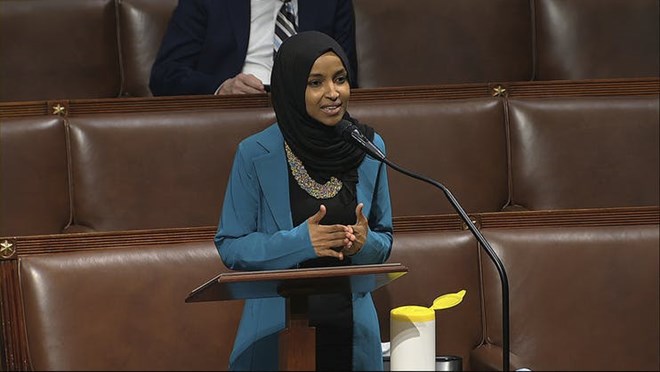
Wednesday May 20, 2020

From childhood onward, according to her new memoir, Rep. Ilhan Omar often seemed to find herself in the middle of nasty fights.
"I was small but a good fighter. I pulled the boy down and rubbed his face in the sand," the Minnesota congresswoman writes, recalling a scrap with a bully during her childhood in Somalia. Later there was a confrontation in a middle school locker room in northern Virginia, again in the face of bullying: "As I hit her, the others yelled, 'She's pregnant!' I didn't stop hitting."
advertisements
Omar's memoir, "This Is What America Looks Like: My Journey from Refugee to Congresswoman," arrives in bookstores next week, just as her re-election campaign readies for a spirited DFL primary challenge. Minneapolis bookseller Magers & Quinn is hosting a virtual book launch with Omar the evening of May 26.It is the most complete account she has given to date of her turbulent rise to the Minnesota Legislature and Congress, though it leaves out controversial details of her most recent divorce and remarriage.
advertisements
Tracing her life from Somalia to the U.S., from Minnesota to the halls of Congress, the high-profile Democrat often frames her experiences as battles: from the schoolyard brawls of her youth to conflicts with a family she felt didn't take her seriously and to discord within a Minneapolis Somali community that she says led to lies about her personal life that still dog her political career.And all that came before her war of words with President Donald Trump.
"Fighting didn't feel like a choice," Omar writes. "It was a part of me. Respect goes both ways."
Omar's book fills in details of her life in Somalia before the country's government collapsed in 1991, forcing her family to flee. Her extended family, populated with teachers and civil servants, had been living what she describes as a comfortable middle-class existence at a compound in Mogadishu, "filled with African art, books of history, Somali poetry and music."
Unlike the experiences of many other Third World refugees, hers was not a life of destitute poverty. Her family found itself on the wrong side of the clans that seized power after the civil war, and they fled to a refugee camp in Kenya when Omar was 8 years old. Her mother having died when she was a preschooler, Omar was particularly close to an aunt whose death she witnessed at the Utange camp.
After some four years the family made it to America, first to suburban Virginia and then Minneapolis. Here the settings become more familiar to her Minnesota constituents. Omar attended Edison High School in Minneapolis, and met her first husband and father of her three children, Ahmed Hirsi, in the parking lot of Roosevelt High School.
Omar, now 37, pins her political awakening to her early 20s. But as described in a chapter titled "Early Midlife Crisis," it was also a turbulent time when she split from Hirsi for the first time, married another man, enrolled in North Dakota State University, impulsively shaved her head, and suffered debilitating headaches.
The book offers a guarded account of a choppy romantic life that has become fodder for the tabloid press, Trump and her critics on the right. It says nothing about how her remarriage to Hirsi collapsed last year, shortly before she married Tim Mynett, a political consultant for her campaign.
She describes Ahmed Elmi, her second husband, as a man "whom I spent so little time with that I wouldn't even make him a footnote in my story if it weren't for the fact that this event turned into the main headline later on."
Omar writes no more about how she met Elmi or why they decided to marry. But by 2016, when she was running for state Legislature, she writes that the brief marriage was spun by a Somali blog into an allegation "that I had married a relative [reportedly her brother] illegally, to get him entry into the United States" — which isn't true, she writes.
"That Somalis were some of my harshest critics might seem absurd. But they refused to accept me because I refused to kiss the ring," Omar writes. She credits her father, now retired after a decade as a postal worker, for refusing pressure from Somali elders to push her out of her first political race.
Opposition from some in her own community was not enough to slow Omar's rapid ascent into national politics. In 2018, she was one of the first two Muslim women ever elected to Congress.
Given the progressive convictions that Omar frequently describes in her book, toward the end she reveals a surprising political inspiration. She describes Margaret Thatcher, the former Conservative Party prime minister of the United Kingdom, as "my greatest hero."
Despite vast political differences, Omar writes that she loves Thatcher's "Iron Lady" style, revealing that her father once gave her the same nickname: "Without any kind of special invitation or connections, time and time again she showed up in rooms filled with men and didn't have to do much to lead them to decide that she should be in charge."